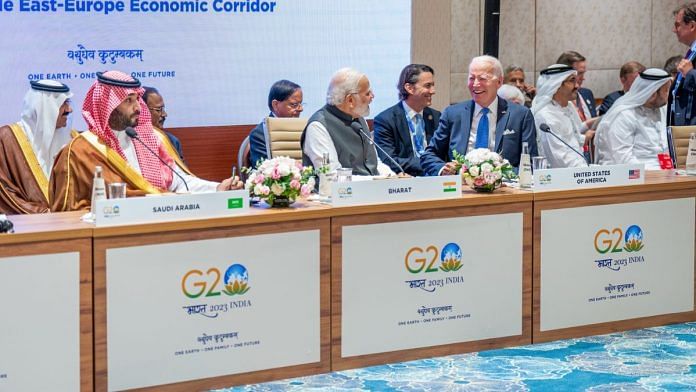As the G20 summit winds down, much attention has been given to India’s success in crafting a compromise declaration. However, in the larger scheme of things, this achievement may be somewhat less significant. Other, more substantial accomplishments have been made, though they are not directly related to the G20 agenda. One such achievement is the initiative to build a rail and shipping corridor and the associated infrastructure connecting India to Europe via the Middle East. Along with this, the European Union has announced plans for a ‘Trans-African Corridor’ to improve transportation within Africa.
Obviously, a lot depends on how these projects come to fruition. But in the realm of international politics, they strike another blow at China and its key grand strategic achievement, the Belt and Road Initiative (BRI).
China’s BRI is a smart geopolitical move that has brought it great benefits both in its immediate neighbourhood and in regions like Africa and Central Asia. China offered its undoubtable skills in building infrastructure, combining it with a no-questions-asked approach to political conditions such as democracy and human rights or even economic factors like project viability and financial feasibility. Considering that such conditions were a key factor in Western economic assistance, Beijing’s approach helped it garner support from many emerging economies, often referred to as ‘Global South’. It resulted in closer economic ties, trade relations, and, most importantly, significant political linkages and patronage. It took some time for the rest of the world, particularly the West, to fully comprehend the international political impact of what Beijing was up to.
India took an early stance in opposition to the BRI, mainly because parts of China’s infrastructure development was the China-Pakistan Economic Corridor (CPEC), which traverses through Pakistan-occupied Kashmir (PoK). Over time, as India and Western nations fully recognised the need to counter the BRI, they began collaborating to oppose China’s infrastructure push.
Also read: Simple G20 truth is—India gained in last Cold War by playing both sides. No longer a choice
Countering BRI
The initial pushback was centred around the discourse surrounding China’s BRI. India and the West also took up cudgel on behalf of the same developing countries that had subscribed to the BRI, arguing that it could lead to a debt trap. Regardless of the veracity of this claim, the debt-trap discourse undermined Beijing’s discourse about China being an honest, sympathetic country simply helping poor countries that the West wouldn’t. This has been a grand success, but as important as this discourse was, it was necessary to complement it with alternative development and infrastructure assistance. This has been an increasing focus of India and the West.
While no single country can match China’s resources, collectively they could bring their strengths together, especially as they coordinated their efforts. Though this has taken some time, infrastructure development, including digital connectivity, has increasingly become a key focus for Western partners, including India.
The BRI was one of China’s geopolitical trump cards. Now, with the unwieldily named India-Middle East-Europe Economic Corridor, India and its partners strike another blow to China’s BRI and out-build it. And this is a big one. The project’s scope should create some excitement, because it can potentially reshape the discourse around development and infrastructure assistance, taking the fight to Beijing on the international stage.
It’s still early to predict the project’s success, as it’s still a proposal at this stage. How it will translate on the ground is a fair question, considering that no other country has demonstrated China’s level of skill and determination in completing such massive international projects. Nonetheless, it underscores the fact that, for all the moralising, talking and the sloganeering, international politics is increasingly defined by hard power competition.
The author is a professor of International Politics at Jawaharlal Nehru University (JNU), New Delhi. He tweets @RRajagopalanJNU. Views are personal.
(Edited by Prashant)



